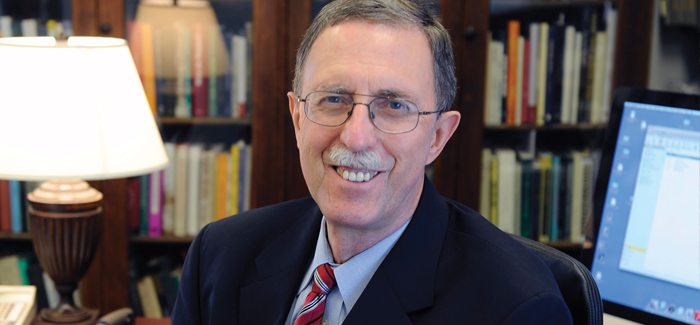
Boyer, a historian of the Habsburg Empire, became dean of the College in 1992. He began an unprecedented fifth term in that office in 2012. (Photography by Dan Dry)
Dean of the College John W. Boyer reflects on the legacies of great professors past, “an inheritance we must renew for our successors.”
Last year the College lost two colleagues—Bert Cohler, AB’61, and Herman Sinaiko, AB’47, PhD’61—who embodied our ideal of a shared academic enterprise. Herman and Bert were inspiring teachers who introduced generations of students to the pleasures and the demands of learning in our University. They also cared deeply about the broader communal structures that sustain our academic work. In their honor, we have renamed two beautiful common rooms in Burton-Judson, one for Herman and one for Bert, and inaugurated in those settings a series of talks for students by Quantrell Award–winning teachers.
Herman as dean of students in the College, Bert as resident head at Burton-Judson, and both of them in many other ways, were acutely aware of the fact that although our community is primarily academic we must always be mindful of the importance of encouraging strong patterns of friendship, sociability, and collaboration among our undergraduates. The College’s future depends upon investment in the intellectual and cultural success of our students—their academic achievements, the infrastructure that makes those achievements possible, and the use to which they put their educations in the short term and over the long arc of a lifetime.
We think about these investments in four parts. First, our fundraising for academic programs will center on an effort to endow the Society of Fellows in the Liberal Arts and thereby provide strong and enduring support for the teaching programs that are signature elements of a liberal arts education at Chicago. We will also seek to add additional College professorships to the faculty. These are endowed positions for senior colleagues who exemplify the ideal of teacher-scholar first articulated by William Rainey Harper and regularly invoked by all of the University’s presidents, because it embodies the spirit of the University of Chicago as a place where the faculty regards teaching at all levels as vital to the life of learning and the fruitfulness of research.
We will also be seeking new funds in support of financial aid for our students—including new gifts to the Odyssey Scholarships that will allow us to reduce or eliminate loan obligations for more families with low and moderate incomes. Moreover, we will seek funds to support merit aid for some of our most talented students—students with many choices about where to attend college. We also want to add funds that will allow us to support more international students in the College.
We are also concerned that our students have as many opportunities as possible to make thoughtful and effective plans for their futures. We have begun to build a suite of programs through the Office of Career Advancement (formerly Career Advising and Planning Services) that helps our students connect with alumni and professional networks in multiple fields, and also to take advantage of the resources available in our professional schools. Expanding the College’s Metcalf Internship Program is also a crucial feature of this area of activity.
Our faculty, our students, and our alumni are fully engaged in the world beyond campus, and the fourth pillar of our plans takes its inspiration from that fact. We will seek to secure funding to insure the growth and the permanence of our civilization courses, our Center in Paris, and our many projects abroad. Our civilization courses in Jerusalem and Vienna were endowed by generous gifts from College alumni in the past year, and in the spring quarter of 2013, the 17th civilization course abroad was inaugurated in Istanbul. This year we will also see new investments in our Chicago Studies initiatives.
The University’s strength resides in its remarkable ability to sustain itself across the generations. Our research and teaching today depend upon the intellectual and material inheritance of the past, an inheritance that we must renew for our successors.
